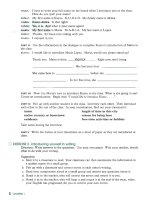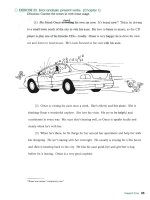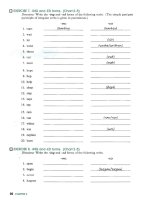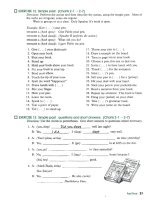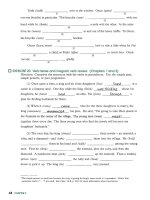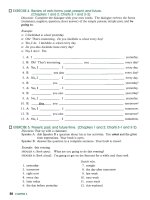Fundamentals of english grammar third edition part 8 ppt
Bạn đang xem bản rút gọn của tài liệu. Xem và tải ngay bản đầy đủ của tài liệu tại đây (446.99 KB, 7 trang )
EXERCISE 12. Simple past. (Charts 2-1
-
2-7)
Directions:
Perform the action and then describe the action, using the simple past. Most of
the verbs
are
irregular; some are regular.
Work
in
groups or as a class. Only Speaker A's book is open.
Example:
Give
(
.
.
.
)
your pen.
SPEAKER
A
(book open):
Give Pablo your pen.
SPEAKER
B
(book closed): (Speaker
B
petforms the action.)
SPEAKER
A
(book
open):
What
did you do?
SPEAKER
B
(bwk
dosed):
I gave Pablo my pen.
I
.>,
1.
Give
(
.
.
.
)
your dictionary.
8)
2
>
11
.;,
2.
Open your book.
3.
Shut your book.
/
4.
Stand up.
5.
Hold your book above
your
head.
6.
Put your book
in
your lap.
7.
Bend your elbow.
8.
Touch the tip of your nose.
9.
Spell the word "happened."
10.
Shake hands with
(
. . .
).
1 1.
Bite your finger.
12.
Hide your pen.
13.
Leave the room.
14.
Speak to
(
.
.
.
).
15.
Tear a piece of paper.
16.
Tell
(
.
. .
)
to stand up.
17.
Throw your pen to
(
. . .
).
18.
Draw a mangle on the board.
19.
'hn
to page ten
in
your book.
20.
Choose a pen, this one or that one.
21.
Invite
(
. .
.
)
to have lunch with you.
22.
Thank
(
.
. .
)
for the invitation.
23.
Steal
(
.
. .
)'s pen.
24.
Sell your pen to
(
.
.
.
)
for a (penny).
25.
Hit your desk with your hand.
26.
Stick your pen in your pocketJpurse.
27.
Read a sentence from your book.
28.
Repeat my sentence: This book is black.
29.
Hang your (jacket) on your chair.
30.
Take
(
. . .
)'s grammar book.
3
1.
Write your name on the board.
EXERCISE
13.
Slmple past: questions and short answers. (Charts 2-1
-
2-7)
Directions;
Use the words in parentheses. Give short answers to questions where necessary.
1.
A:
(you,
sleep)
DIA
YO&
S~P
well last night?
A
B: Yes,
I
Xi
I
(sleep)
slept
very
welt.
2.
A:
(Tom's plane,
arrive)
on time yesterday?
B: Yes,
.
It
(get)
in
at
6;05
on the
dot.
3.
A:
(~0%
go)
to class yesterday?
'.
.I'
'
-
B:
No
.
I
(SW)
home because I
Cfe4
not)
good.
4.
A:
(Mark Twain,
write)
Tom
Sawyer?
B: Yes,
.
He also
(write)
Huckleberry
Finn.
5.
A:
(you,
eat)
breakfast this morning?
,
,
B: No,
.
I
(haw,
not)
enough
time. I was late for class because my alarm clock
(ring, not)
0
EXERCISE 14. Slmple past: questions, short answers, and Irregular verbs.
(Charts 2-1
+
2-7)
,
>,
2
Directions:
Pair up with a classmate.
Speaker
A:
Ask questions beginning with
"LMyou
. .
.
?"
Listen carefully to Speaker B's
answers to make sure he or she is using the irregular verbs correctly. Look at
Chart
2-7
if necessary to check the correct form of an irregular verb. Your
"
''
book is open.
Speaker
B:
In order to practice using irregular verbs, answer "yes" to all of Speaker A's
questions.
Give
both a short answer and a long answer. Your book is closed.
Ermple:
eat breakfast this morning
SPEAKER
A
(book
open):
Did you eat breakfast this morning?
';YN:
SPEAKER
B
(book
closed):
Yes,
I
did.
I
ate breakfast this morning.
.iar
1.
sleep well last night
6.
2.
wake up early this morning
7.
.r
.:A
.i
3.
come to class early today
8.
4.
bring your books to class
9.
5.
put your books on your desk
10.
Sm'tch
roles.
11.
hear about the earthquake
17.
12.
read the newspaper this morning
18.
13.
catch'a cold last week
-
-
. .
,
,
,
.
.
-:.
19.
''
14.
feel terrible
,
'I
20.
15.
see a doctor
.
-
. ~.
.,_~
16.
go to a party last night
ivptnt;
Switch
roles.
21.
buy some books yesterday
26.
22.
begin to read a new novel
27.
23.
fly to this
city
28.
24.
run to class today
29.
25. write your parents
a
letter
30.
,I
;,:<,:I
Switch
roles.
~. .
,,s
f&,.< :,
,
5
31.
make your own diier last night
36.
"\.:
32.
leave home at eight this morning
37.
!i:3
,.,.
33.
drink
a cup of tea before class
38.
15
34.
fall down yesterday
39.
35.
hurt yourself when you fell down
40.
lose your grammar book yesterday
find your grammar book
take a bus somewhere yesterday
ride
in
a car yesterday
drive a car
:
(1
;.'c,
;<:
.'.<
'
':1'
/I
;,
have a good time
.
think about me
,
-'
.:&',
2
meet
(
. .
.
)
the first day of class
shake hands with
(
.
. .
)
when you fist met
himher
-,;.
;
.
,
.
.i-
;
i
send your parents a letter
lend
(
.
.
.
)
some money
wear a coat yesterday
go to the zoo last week
feed the birds at the park
break your
arm
understand the question
speak to
(
. . .
)
yesterday
tell himher your opinion of this class
mean what you said
80
CHAPTER
2
EXERCISE
15.
Past
time.
(Charts
2-1
+
2-7)
Direcrions:
Pair up with a classmate.
Speaker
A:
Tell Speaker B about your activities yesterday.
Think
of at least five things you
did yesterday to tell Speaker B about. Also
think
of two or three things you
didn't do yesterday.
Speaker B: Listen carellly to Speaker A. Make sure that Speaker A is using past tenses
correctly. Ask Speaker A questions about hidher activities if you wish. Take
notes while Student A is talking.
:
9
When Speaker A finishes talking, switch roles: Speaker
B
tells Speaker A about hidher
activities yesterday.
Use the notes from the conversation to write a composition about the other student's
-
,
activities yesterday.
THE
SIMPLB
PAST
4-
THB
PAST
PROGRESSIVE
(a)
Mary
waked
downtown
yesterday.
(b)
I
&fit
for eight hours last
night.
9,
(c) I sat down at the diier table
8t 6:00
P.M.
yesterday. Tom
came to my house at 6:10
P.M.
I
was eating
dinner
when Tom
cum.
(d) I went to bed at 10:OO. The
phone rnng at 11:OO.
I
was
sloepr'ng
when
the
phone
mng.
The
s1MPI.B
PAST
is used to talk about
an
activity
or
situation
rhar
began and ended at a
pardcular time in thepasr
(e.g.,yestmiq,
last
night,
days
ago,
in
1999),
as
in
(a)
and
(b).
The
PAST
PROGRESSIVB
expresses
an acriviry
that
was
in p*og*esr
(was
occurring,
was
happem'nk,
at a point of time
in
the past
(e.g.,
at
6:10)
or at the time of another
action (e.g.,
when Tom came).
In
(c): eating was in progress at 6:lO; eating
was
in
progress
when Tom came.
FORM:
wastwere
+
-ing.
(e)
When
the
phone rang,
I
was sleeping.
whon
=
at that time
(f) The phone rang
while
I
was sleeping.
while
=
during that time
(e) and
(f)
have the same meaning.
1
2-9
FORMS
OF
THE
PAST PROGRESSIVE
STATEMENT
NEGATNE
QUBSTI~
SHORT
ANSWBR
I-She-He-It
wus
working.
You-We-They
were working.
I-She-He-It
was not (wasn't) working.
You-We-They
were not (weren't) working.
Wu
I-she-he-it
working?
Wwe
you-we-they
working?
Yes, I-she-he-it
was.
Yes, you-we-they
were.
No, I-she-he-it
wasn't.
No, you-we-they
weren't.
EXERCISE
16.
Simple past and past progressive. (Charts
2-8
and
2-9)
Directions:
Complete the sentences with the words
in
parentheses. Use the simple past or
u(J't
-W
the past progressive.
1.
At 6:00
P.M.,
Bob sat down at the
table and began to eat.
At
6:05,
Bob
(eat)
.,
dinner.
2.
While Bob
(eat)
:
!K~
,'
\,.
39,
dinner,
AM
(come)
through the door.
dinner.
4.
Bob went to bed at 10:30. At 11:OO Bob
(skep)
'
"'
'
5. While Bob
(sleep)
,
the phone
(rind
I
-
6. In other words, when the phone
(rink,
,
Bob
(sleep)
7.
Bob left his house at 8:00
A.M.
and
(begin)
to walk to class.
to class,
Mrs.
Smith.
:
,
.
9.
When Bob
(see)
Mrs.
Smith, she
I
(stand)
on her front porch.
i
She
(hold)
a broom.
10. Mrs. Smith
(wave)
at Bob when
i
she
(see)
him.
I
.
,
EXERCISE
17.
Using the past progresslve. (Charts 2-8 and 2-9)
Directions:
Perform the actions and answer the questions. Only the teacher's book is open.
Example:
A:
write on the board B: open the door
To
STUDENT
A:
Please write on the board. Write anything you wish.
(SzudenrA writes on
the
board.)
What are you doing?
3.
Response:
I'm writing on the board.
To
STUDENT
A:
Good. Please continue.
TO
STUDENT
B:
Open the door.
(Student B opens the door.)
What did you just do?
Response:
I opened that door.
To
STUDENT
A:
(Student A),
thank you. You may stop now.
To
STUDENT
C:
Describe the two actions that just occurred, using
when.
Response:
When
(Student B)
opened the door,
(Student A)
was writing on the board.
To
STUDENT
D:
Again, using
while.
Response:
Whiie
(Student
A)
was writing on the board,
(Student B)
opened the door.
.
.
-
!,!:
l.A:writeanoteto( ) B:knockonthedoor
,dl:,.
.
t
. .
I'
,
2.
A:
walk around the room
B: clap your hands once
3.
A:
talk to
(
. .
.
)
B: come into the room
I
/'; ?Y.!
.
:
4.
A:
read your book
B:
tap (Student A)'s shoulder
,<'
I
,!.I,.
5.
A: look out the window B: ask (Student A) a question
"
. .
6.
A:
whistle B: leave the room
7.
A:
look at your watch B: ask (Student A) a question
8.
A:
pantomime eating (pretend to eat)
B:
sit down next to (Student A)
9.
A:
pantomime sleeping B: take (Student A)% grammar book
10.
A:
pantomime
drinking
a glass of water
B:
come into the room
EXERCISE 18. Present progresslve and past progressive. (Charts 1-1,2-8, and 2-9)
firectionr:
the present progressive and past progressive verbs in the following
pairs of sentences. Discuss their use. What
are
the similarities between the two tenses?
1. A: Where are
Ann
and Rob?
I
haven't seen them for a couple of weeks.
B: They're out of town. They're traveling.
2.
A:
I
invited
Ann
and Rob to my birthday party, but they didn't come.
B: Why not?
A: They were out of town. They were traveling.
3.
A:
What was
I
talking about when the phone interrupted me?
I
lost my train of
thought.
B: You were describing the website you found on the Internet yesterday.
4.
A:
I
missed the beginning of the news report. What's the announcer talking about?
B: She's describing; conditions in Bangladesh after the flood.
I"./-
5.
A:
Good morning, Kim.
B: Hel10,Tom. Good to see you.
A:
Good to see you, too. On your way to work?
B: Yup. I'm walking to work today to take advantage of the beautiful spring morning.
A:
It certainly is a beautiful spring morning.
6.
A:
Guess who I saw this morning.
B: Who?
A:
Jim.
B: Oh? How is he?
A:
He looks fine.
B: Where did you see him?
A:
On the sidewalk near the corner of 5th and Pine. He was walking to work.
EXERCISE
19.
Present and past verbs. (Chapters
1
and
2)
DirectMns:
Complete the sentences with the simple present, present progressive, simple
past, or past progressive.
PARTI.
PRESENT
TlMB
SITUATION:
Right now Toshi
(sit)
.
1s stil-tw
at his desk. He
1
-
(s~Y)
his grammar book. His roommate, Oscar,
(sit)
2
at his desk, but he
(study, not)
3
d
He
(stare)
out the window. Toshi
(want)
5
to
know
what Oscar
(look)
at.
6
7
TOSHI:
Oscar, what
(YOU,
look)
at?
8
I
42
CHAPTER
2
OSCAR:
I
(watch)
the bicyclists. They are very skillful. I
9
(know, not)
how to ride a bike, so I
(admire)
10
anyone who can. Come over to the window. Look at
11
that guy in the blue shirt. He
(steer)
his bike with one
12
hand while he
(drink)
a soda with the other. At the
13
same time, he
(weave)
in and out of the heavy street
14
traffic. He
(seem)
fearless.
15
~SHI:
Riding a bike
(be, not)
as hard as it
(look)
16 17
I'll teach you to ride a bicycle if you'd like.
OSCAR:
Really? Great!
,!,
il
,.
,
!
1
:
TOSHI:
HOW come you don't know how to ride a bike?*
.
,.,
':.,;I
-
,;,.I
,r.
OSCAR:
I
(have,
nevw)
a bike when
I
(be)
18
19
L
!
a kid. My family
(be)
too poor. Once
I
(try)
20
to learn on the bike of one of my friends, but the other kids
'id1
:>
'
,
21
all
(laugh)
at me. I never
(ny)
again
:
I
,
,;
22
23
because I
@e)
too embarrassed. But I'd really like to learn
24
:!!:
now! When can we start?
,
!>',
PART
II. PAST TIME
.
.
.,
Yesterday, Toshi
(sit)
.
.
wms
S
i:L!.'
i
_
~ttthq
at his desk and
(study)
25
his grammar book. His roommate, Oscar,
26
a
L:
J
l,
at his desk, but he
(stway, not)
27 28
He
(stare)
out the window. He
(watch)
29
,I,,
30
bicyclists on the street below.
*"How come?" means
"Why?"
For example, "How come you don't how how to ride
a
bike?"
means 'Why don't you
bow how
m
ride
a
bike?"


